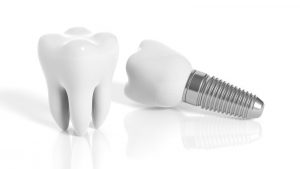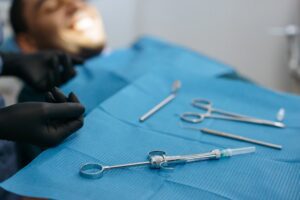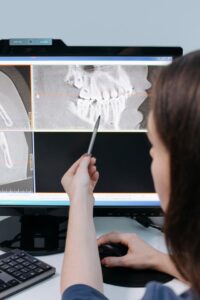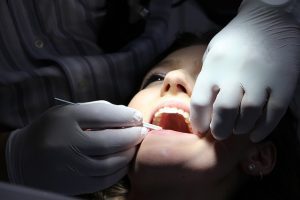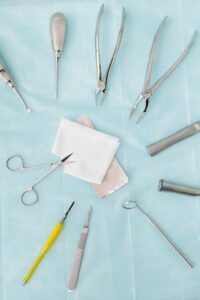- For any questions or concerns, please call our office at (937)382-8020.
Introduction
Experiencing facial trauma or pathology can cause a loss of bone and soft tissue in the mouth. Having this type of damage to the mouth structures can also result in respiratory and digestive system issues. When the damage is more than a simple lost tooth, reconstructive methods must be applied to ensure that repairing the injured/diseased area protects the rest of your mouth as well.
Whole-mouth reconstruction includes both bone and soft tissue restoration via bone and gum grafting techniques. Dental implants are frequently used within these procedures to complete the reconstruction and stabilize the repaired jaw.
Multi-phase procedures like this require an oral and maxillofacial surgeon that specializes in diagnosing oral pathologies as well as repairing maxillofacial damage. They are trained in understanding the intricate structures of the mouth and jaw.
What to Expect
Depending on the problem areas you want to address, the full-mouth reconstruction can take anywhere from a few months and up to a year or more. The initial evaluative and preparation steps can include:
- Initial consultation
- Taking impressions and x-rays
- Formulating a treatment plan with your oral surgeon
- Removing old dentistry
- Removal of all decayed/damaged tissues
- Treatment preparation
- Teeth impressions
These steps are followed by the reconstruction phase, which can include things like placement of new dental implants, grafting missing gum tissue, releasing the TMJ, as well as any other custom restorations.
Pre-Op Instructions
In order to prepare for your surgery and to ensure your safety, please follow these instructions:
- Do not eat or drink anything for 6 hours before your surgery. For your safety, we need you to have an empty stomach.
Do not use any Cannabis products for at least 72 hours (three days) prior to surgery.
Continue all medications prescribed by your physician. Do not stop any medication unless directed by your physician.
Escorts must stay during surgery and to please have your adult escort take you directly home after the surgery.
Dress comfortably. Please wear shoes that tie or boots, no slip on shoes. Please wear a short-sleeved shirt. If cold, a sweatshirt is ok, but remember the short-sleeved shirt underneath.
Please do not wear necklaces, dangling earrings, or make-up on the day of surgery.
Please do not wear contact lenses, wear glasses on the day of surgery.
For moms of teenage boys – we do offer free haircuts – just let us know how short.
Post-Op Instructions
- Immediately after surgery: Resting for the first one to two days will help begin your healing. Heavy physical activity can result in increased pain and prolong the healing time. Once you get home, rest and relax. Elevating your head, placing cold packs on your face and eating soft foods are important post-operative instructions to remember. Refraining from smoking will help the surgical sites heal better and can decrease post-operative pain.
- Pain: Most patients require pain medication for one or two days after their surgery. Narcotic pain medications will make you groggy and slow your reflexes. Do not drive, operate machinery, or drink alcoholic beverages while taking these medications. Also, do not take these medications on an empty stomach, as this can increase nausea and vomiting.
- Bleeding: Some bleeding is to be expected following tooth removal. Minor bleeding or oozing for the first few days is not uncommon. Firm pressure on either a gauze pad or a moistened tea bag for thirty minutes will stop the bleeding in most cases. Keeping your head elevated will also help. If bleeding does not subside, please call us for additional instructions.
- Swelling: Ice, frozen peas, or a gel pack will be of great benefit to minimize post-operative swelling. This needs to be started as soon as possible after the surgery and continued for the first 24 hours in order to help the most. Swelling will peak on days 2-3 post-operatively, and then decrease each day. After 48 hours, moist heat will help to decrease swelling and bruising quicker.
- Diet: Eating soft foods for the first few days will make your recovery easier. Do not use a straw for the first two days – this can increase bleeding.
- Oral Hygiene: Be gentle with cleaning your mouth after surgery. Do not vigorously rinse your mouth for the first 24 hours. Gently brushing and rinsing are important. Rinsing should be done using lukewarm water with either a teaspoon of salt added or a small amount of Scope or Listerine added. If you are given a plastic irrigating syringe, do not begin irrigating until day 7 post-operatively. The salt water or Scope-water solution is used for irrigating.
- Medications: Do not stop any medication which has been prescribed by your physician, unless directed to do so by your physician.
Learn More
What is Full-Mouth Reconstruction, and How Can it Help Me?
Do you feel like your teeth are not looking or functioning at their best? Your mouth is a vital and delicate place, and any damage
Repairing Massive Facial Trauma after an Accident
Oral and maxillofacial surgeons might be the ultimate puzzle solvers. Facial trauma, especially when it involves complex fractures, requires a specialized hand and an understanding
What to Expect from Full Mouth Reconstruction: Costs, Goals, & Care Considerations
Full mouth reconstruction is the process of rebuilding or restoring all the teeth in both the upper and lower jaws. The treatment essentially gives you
How Much Will Dental Implants Cost in 2020? An Affordable Approach
Need a dental implant? You’re not alone. More than 3 million people in the US have them — and over 500,000 will get them this
Thinking About Full Mouth Reconstruction? Read This First!
Not too happy with your smile? An oral surgeon might be able to help. A full mouth reconstruction could be just the ticket to boost
Full Mouth Reconstruction: Treatment Options and Affordable Cost Considerations Explained
Full mouth reconstruction is exactly what it sounds like: the rebuilding or replacing of all the teeth in a patient’s mouth, usually through dental implant


